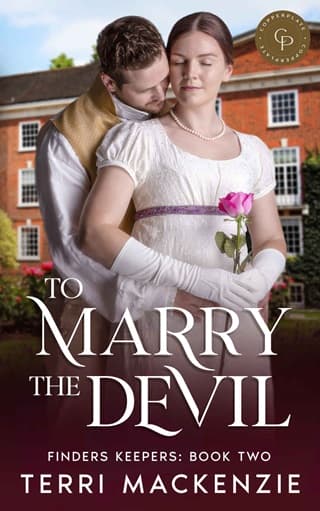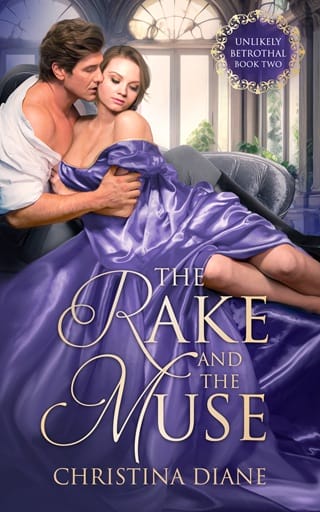Chapter One
January 25th 1814
Lord Jacob Barrington crawled out of the ditch that held his curricle and took stock of the situation. Groaning, Mrs Clarissa Bentley also extracted herself from the splintered wood, and he extended a lazy hand to her.
"How gentlemanlike of you," she said with a trace of irony.
"For you, my dear? Anything."
"You could have not taken the corner too fast and upturned the carriage," she said impatiently, but he was already striding towards the horses, examining them with a critical eye marred slightly by the fact he was, as it happened, somewhat drunk.
"Damn," he said as he noted one of the horses had twisted its fetlock. "Riding home is out then, I suppose."
Clarissa sighed. "I suppose I should have known better than to accept the Devil's offer of company."
"You should," he agreed. People often said that about him. He was known as the Devil of St James, which meant that most who involved themselves with him grew to wish they had not.
Two years ago, Clarissa had been unfortunate enough to marry a gentleman many years her senior, and fortunate enough to see him buried within six months. Now, she was a rather fast widow, and Jacob offered her company and entertainment with no expectations. Both things she provided, to an extent, in return.
"And yet," she said, "I still chose to accompany you."
"A poor decision."
"I should have known better."
"I quite agree." He freed the horses and looked at the curricle again. One of the wheels had detached entirely and the other had shattered spokes; the seat was, regrettably, pierced by a shard of wood they were lucky had not impaled them too. All in all, the chances of getting this particular carriage fixed were small. Especially at the side of an empty country road.
Of course, it was unfortunate they had crashed. But considering he'd stolen Cecil's horses and carriage, he didn't feel burdened with the cost of replacing them.
He would, however, arrange to have the remainder of the curricle towed back to his brother, as a token of goodwill. That would be sure to get a reaction. After twenty-six years of less-than-cordial rivalry and being the inferior brother, baiting Cecil was as much habit as inclination.
"Well?" Clarissa asked, her arms folded and her eyebrows raised. Her bonnet had all but fallen off her head and her gloves were muddy. "What are you going to do?"
"Regretfully, I am not going to ravish you on the blanket I had procured specifically for the occasion."
"Regretfully?" She looked at him in exasperation. "If you had thoughts of ravishment in mind, you would have done better to visit my house. Where there is a bed."
"Then where would be the adventure?" he mocked.
"Between the sheets. Or perhaps on the floor. Against the wall. There are plenty of places the more adventurous of us might look."
"And yet it lacks a certain something," he murmured, looking at the empty road. London was not far away, but they were surrounded by green hedges and fields, with not another soul in sight. "I believe we are going to have to avail ourselves of a stranger's generosity," he said. "We passed a farm a mile or two back."
"My shoes," she said in resignation.
"How unfortunate," he said, not giving a damn about her shoes or any other aspect of her appearance. In addition to being a widow, she was fabulously wealthy, which was more than he could claim. His income came from the generosity of his brother—which was to say, he had little income except for when he won it at the card table.
"If they ask, I shall claim to be your wife," Clarissa warned as he cut the horses free and took hold of their reins.
"Certainly, so long as you have no aspirations in that regard."
She gave an unladylike snort. "I most definitely do not. You, Jacob Barrington, would make a very uncomfortable husband."
He gave her a glittering smile. "I'm glad to hear it."
"But it truly is a shame that the best lovers make the worst husbands."
"I'm flattered you consider me your best lover."
"One of," she emphasised, rubbing at the smudges of dirt on her gloves. "And that is hardly the point."
Jacob stifled a sigh. Now there was no prospect of gratification, he found her presence wearying. "It is to me. But, Clarissa, I am one of the best lovers you've ever had only because you require nothing else from me."
"How flattering," she said dryly, but there was no offence in her voice. Jacob knew as well as she did that he was not the only man to warm her bed. "I do believe you're drunk."
"I'm always drunk."
She raised an eyebrow. "Why is that?"
He smiled, though he did not feel like it. "So, my dear, I can forget."
Once Jacob finally returned home, he arranged for the curricle and bill to be delivered to Cecil's house and promptly went to sleep. When he woke, it was to a summons. Cecil enjoyed summoning him. It was his prerogative as the older brother turned marquess; he could require Jacob's presence at any time he chose, and he seemed to take great pleasure in doing so. Mostly, it was so he could lecture Jacob about his lifestyle choices and threaten to cut off his allowance.
In their twenty-six years of being brothers, little had changed except Cecil had grown ever more pompous. He had been just nineteen when their father died, but he had taken up the mantle with a characteristic seriousness. They were born and bred to be opposites: where Jacob was wild, Cecil was restrained; where Jacob was impetuous, Cecil was measured; where Jacob was irresponsible, Cecil took his duties extremely seriously.
One of those duties, of course, was disapproving of everything Jacob did. An easy feat, given Jacob did everything in his power to tarnish the Barrington name. He was known as the black sheep of the family; he was the embarrassment that had to be covered up. He prided himself on excess.
Thus, sensible Cecil had a bee in his bonnet about Jacob finding a vocation.
Jacob had no intention of going into the army or politics or training as a lawyer. And there was nothing that would suit him less than taking up a living, preaching to his parish about the evils of licentious living.
Although, he allowed, he was an expert on the subject.
Therefore, once receiving his brother's summons, he chose to delay until after his leisurely day, which culminated at the new gaming hell that had opened on St James's Street. As a result, he was somewhat inebriated by the time he finally made his way to Cecil's house. Or, rather, the Sunderland London house, the one Cecil had inherited when he had become marquess and wasted no time appropriating for himself.
Smythe, the austere butler, answered the door. "I'm here to see my brother," Jacob said with a swagger he knew the butler hated.
Smythe looked down his nose. "I'm afraid his lordship isn't here."
"Not receiving me, is he? Well, it wouldn't be the first time." Ignoring Smythe's protestations, he forced himself inside, glad of the warming effects of the brandy as he looked around the large, arching space. His family's London home was not a place he had often visited, even as a child, but there were memories etched here just as clearly as the scars on his back.
He strode through to Cecil's study, which was, for once, empty. No fire burned in the grate. Jacob frowned.
"As I informed you, sir, Lord Sunderland is not at home," Smythe said, taking great pleasure in the words. "He asked you to come by this morning."
"I was busy then."
"He is busy now."
"Sensible Cecil going out? It must be an occasion indeed."
"I believe it is a notable occasion, sir, yes," Smythe said.
Jacob spun on the slightly worn carpet to face the butler. "Well? Where is it? And don't tell me you don't know, Smythe, because I shall call you out for being a liar."
Smythe hesitated. Obviously he knew exactly where Cecil had gone; equally obviously, he was reluctant to tell Jacob lest Jacob do something foolish.
A reasonable precaution. Jacob was feeling especially reckless tonight.
"Well?" he demanded. "I could insist on staying here, but then I would be tempted to read through my brother's correspondence to see what secrets he's hiding from me."
"Very well, sir," Smythe said haughtily, his voice so frosty Jacob's fingers almost numbed. "He is at the Norfolk Ball to celebrate Lady Annabelle Beaumont's coming out."
Jacob blinked. Cecil was at a ball? Unusual—if there was one thing the brothers had in common, it was that they both reviled balls and ballrooms and dancing. Cecil because the idea of fun was an alien one, and Jacob because his idea of fun encompassed vastly more interesting things.
As for Lady Annabelle Beaumont . . . Jacob racked his brains to think of a girl under that name. He could think of none. She had probably been told to keep well away from him; most well-bred young ladies were—his reputation as a rake and ruiner had been fixed despite the fact he hadn't entertained himself with unmarried ladies since Madeline.
He shut away the thought and the accompanying shot of pain. Cecil had a decanter of whisky somewhere, and Jacob found it, pouring himself a glass.
So his brother was intending to marry, then. There was no other reason for him to attend this ball. And logically, it shouldn't have come as a surprise; Jacob was surprised he had waited as long as he had. Still. If this was Cecil's plan, it behoved him to ruin it. Revenge of the best—and worst—kind.
"Thank you, Smythe," he said as he drained the last of the glass and placed it hard on the table. He had a ball to get to.
Unusually for a girl of nineteen, Annabelle Beaumont detested balls. Equally unusually, she had no wish to be married—a stance which won her no favours with her mother. It was not that she had any moral objections to the institution; her sister was married, and happily so. Rather, she disliked the process. To be married, one had to talk with strange gentlemen, and as she'd discovered when lavish balls were held in her honour, that was extremely taxing. Then, one would have to be married. Manage a household and please one's husband and present themselves willingly in Society. Annabelle shuddered at the mere thought.
The issue was, and she felt churlish for even considering it an issue, Nathanial Hardinge, the Duke of Norfolk and her sister's new husband, had bestowed upon her a large and exceedingly generous dowry. In the space of a few weeks, she had gone from no one to someone, and her desirability as a conversationalist and dance partner had increased exponentially.
No matter that she flushed red as a beet whenever a stranger directed a word to her. Or that the noise of the crowds made her feel uncomfortable and overwhelmed. Being around so many people, constantly required to be smiling and polite, was intolerable and exhausting, and she hated it.
Unfortunately, her mother and the Dowager Duchess of Norfolk, both keen to see her married at the first possible moment, were not sympathetic to this argument. Thus, Annabelle had curled up in her favourite spot in the ballroom: a small space concealed behind two potted plants. Before the ball had begun, she'd stowed a book there, and after squeezing through the narrow gap, she settled herself on the floor, skirts spread across the cool wood. The novel she'd selected was named Fanny Hill: Memoirs of a Woman of Pleasure, and the main reason she had chosen to read it was because she suspected it was salacious—and she had never read something of that nature before.
Usually, Annabelle read romances. This was something different, and just what she needed to alleviate her boredom.
She thumbed through to the beginning of the book, and had just begun to read the heroine's overwrought emotions when Theodosia, her sister and the new Duchess of Norfolk, squeezed between the plant pots into the tiny space with her.
"This is extremely undignified for a duchess," Annabelle informed her without looking up.
"And reading at your own ball is crass," Theo retorted, making herself as comfortable as she could. "How long have you been here?"
"Not long." Annabelle eyed her sister with resigned irritation. "What are you doing here?"
"The Dowager is looking for you. It's only a matter of time until she checks this hiding spot."
Annabelle closed her book with a snap. The Dowager Duchess of Norfolk was Theo's new mother-in-law and one of the most terrifying women Annabelle had ever met—something the Dowager was well aware of. The only person to ever occasionally defy her was Nathanial, her son, and even then he chose his moments.
"Does she know about this hiding place?" Annabelle asked.
"It's well hidden but not invisible, dearest," Theo said sympathetically before her gaze fell on the book Annabelle was still holding. She gave a little gasp. "Annabelle Lydia Beaumont, do you know what sort of novel this is?"
"I know it's more interesting than the ball," Annabelle said, although strictly speaking she had not reached the interesting parts yet.
"That sort of interesting is . . ." Theo trailed off. "I presume you know precisely what you are letting yourself in for?"
"I think so," Annabelle said carefully. In truth, her understanding of these matters was slim at best, but she was looking forward to opening her eyes to a whole new world.
"Well, I won't stop you if your heart is set on it, but Anna, if you were curious about—that nature of things, you would probably be better placed asking me than reading this."
"I think," Annabelle said dryly, "I would prefer the book."
"Yes, but this is not how it goes in reality."
Annabelle eyed the novel in her lap with renewed interest. "It's not? I thought, as it was about a prostitute, it would be—"
"Heavens, Anna, don't say those words out loud." Theo clapped a hand over Annabelle's mouth, smothering her words. "Take it from one who has read it—it is not even remotely realistic. You see, it was written by a man from the perspective of a woman. Don't you see how that changes things? And," she added significantly, "it was a book written by a man about a woman for man's pleasure. Read it if you will, but do not take it as fact."
Annabelle rolled her eyes. If she succeeded in her goal of remaining unmarried, which was seeming increasingly unlikely with every passing day, she would never have a chance to experience whatever pleasures were outlined in the book. "I won't."
"And do not let Mama see you've been reading such a thing."
"I won't," Annabelle said again, tucking the book in the corner. She sighed, resigned, as the sound of her name cut through the air. "I suppose I should see what she wants with me."
"You mean who," Theo said.
"Spare me," Annabelle muttered. "How did you persuade your suitors not to propose?"
"I didn't," Theo said heavily. "Remember the Earl of Whitstable?"
Annabelle fell silent. As it happened, she did remember the Earl of Whitstable, the elderly gentleman who had wanted to marry Theo for her childbearing hips. If it hadn't been for Nathanial intervening and proposing instead, their lives would look very different.
At least she did not have childbearing hips. Although it appeared her dowry was sadly large enough to offset that particular defect.
"It's like she's trying to marry me off before I turn twenty," Annabelle said heavily.
"Well that does only leave her four months," Theo said, and squealed as Annabelle pinched her arm. "Just reject all your offers. The Dowager and Mama can't do much about that."
"Easy enough for you to say," Annabelle said, taking a few deep breaths as she prepared to leave her refuge. "You'd have married Whitstable if Nathanial hadn't come along and proposed instead."
"I would have done my duty by my family," Theo said primly, "but now I've provided for us all, and excellently I might add, you have more freedom of choice."
More freedom to choose a man she liked, Theo meant—Annabelle was still expected to take a husband. Even her sister, sympathetic to a fault, didn't really believe she would go through with her plan to remain unmarried.
No. A romantic at heart, Theo believed Annabelle just had to meet the right man and fall in love and everything would slot into place. What she didn't understand was Annabelle struggled to talk to strangers, and the chance of her meeting a man she cared about, who also shared her aversion to Society and London, was deeply unlikely. The very thought of spending the rest of her life with someone she despised was enough to make her skin prickle.
And, frankly, Annabelle would rather read a good book.
"Oh no," Theo whispered as a nasally voice went past. "Wait a moment. That's Lady Tabitha."
Annabelle had met Lady Tabitha enough to know two things: she was an insatiable gossip, and she didn't respect personal boundaries.
They waited until she'd gone before emerging from their hiding place, brushing down their dresses and hoping no one had seen them.
Objectively, Annabelle knew the ball was a success. Hothouse flowers were wound around the pillars and overflowing from copper bowls. Lamps and chandeliers sent merry, flickering light across the room, and the floor was elaborately chalked.
It was also loud, hot, and crowded, and she hated it.
Nathanial hailed Theo from where he stood with a large circle of his friends. Annabelle could have gone too, but she didn't particularly enjoy trailing behind her sister like a lost puppy. For a moment, she was tempted to flee to the double doors at the end of the room. Escaping via them would mean traversing the entire ballroom, but once she was there, she could easily make her way to her bedchamber. Or, failing that, the library.
"Lady Annabelle," the Dowager Duchess of Norfolk called, coursing through the crowd like a ship in particularly full sail, a gentleman following in her wake. Young ladies scrambled to move out of the way, and Annabelle couldn't blame them. She felt like a butterfly pinned to a board.
"Your Grace," she managed, sinking into a curtsy.
"Where have you been? Your own ball and you have only stood up twice." The Dowager sniffed, piercing Annabelle with a glare that went straight through her, and lowered her voice to a harsh whisper. "Don't look so nervous, girl. It's not becoming."
As far as the Dowager was concerned, nothing Annabelle did was becoming, which was probably why she was determined to get Annabelle married off so quickly.
"No, ma'am," Annabelle said quietly.
"Good. Now"—the Dowager slapped her closed fan against her gloved hand—"I have a gentleman who wishes to be acquainted with you."
Annabelle reluctantly glanced at the sandy-haired man to the Dowager's right, who had remained silent for this entire exchange.
"This," the Dowager said with no little excitement, "is the Marquess of Sunderland."
 Fullepub
Fullepub 



